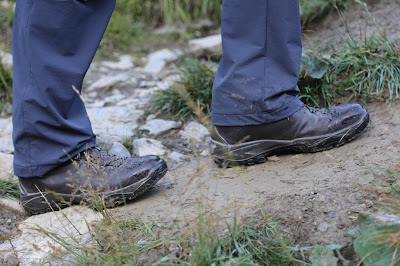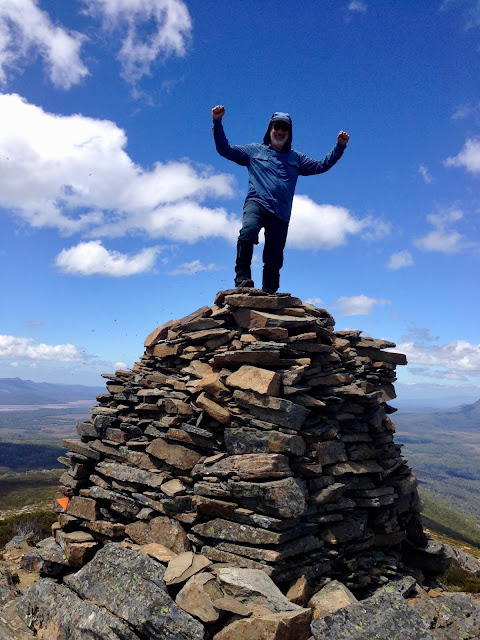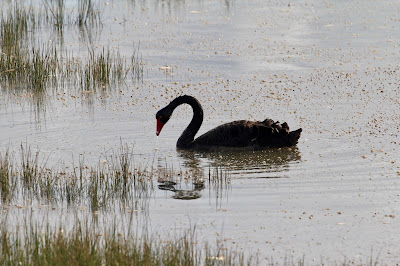Perhaps it’s too soon for any examiner to dare set that question. But … might there be some truth in the statement? I’ll leave a fuller consideration of that to another time. Here I want to reflect on some of my own unexpected learnings (dare I call them blessings?) during two separate lots of Covid-19 lock-down.
[Pining for Scenes Like This]
It didn’t take long before sourdough baking, Zoom meetings, Netflix bingeing, and too much eating and drinking, began to pall. I found myself, to borrow from Monty Python, pinin’ for the fjords. More accurately, I was pining for the Tasmanian wilderness. I passionately wanted to be out walking there, but the rules of lockdown meant I couldn’t stray far from home.
As I pondered why I felt so strongly about my inability to be wild walking, I came to a surprising conclusion. I realised that in large part it was my soul that was pining to be out there. And that’s because, for me, walking has a strongly spiritual dimension to it*.
Bushwalking as spiritual? Surely it works the other way around, where the spiritual life is the focus, and words like walk, journey, path, or way are just figures of speech to help us understand it? Certainly moving feet have always seemed an ideal metaphor for the life of the spirit, as if soles and souls are deeply related. But what if this link between walking and spirit is more than just a metaphor? Might we legitimately speak of walking itself as spiritual?
[Sole to Soul: Really?]
I spent much of lockdown reflecting on, and trying to write about, this link. I’ve come to call it the sole to soul connection. Most of that writing isn’t ready to be shown, but perhaps a sampler of that work might give some idea of the territory I’m trying to cover.
This particular excerpt centres on practices: what bushwalkers might do to grow their own soul while out there walking. It’s tentative, brief, and incomplete, and it won’t suit all walkers. Let me know what you think!
* (For now I will leave aside how we might define words like “soul” and “spiritual”.)
1) Beyond Bragging
We’re tramping in New Zealand’s Aspiring National Park. It’s raining, and our group stops at a hut for a snack and a drink. It’s mid morning, but the inside of the hut is still full. So we’re huddling under the shelter of the verandah when some of the incumbents come out, preparing to leave. We find out they’re also Australians, and we soon get chatting about where we’ve been and where we’re going, as you do when you meet other walkers.
But the talk soon takes on an unusual edge. This group, from one of Australia’s big cities, is uber keen to tell us how many other walks they’ve done, loudly and repeatedly. When we get a word in, they gleefully jump on any walk they learn we haven’t completed. “Oh dear! You haven’t seen New Zealand until you’ve done …”
Afterwards I tried to understand why this interaction dispirited me … and why I began introducing myself as a Tasmanian when in New Zealand! The truth is nobody actually enjoys hearing bragging, and I’ve since come to see things such as “been-there-done-that” tick lists, peak bagging, boasting about beating track times, talk of “conquering” mountains, being strongly competitive, and an over-fondness of your own fitness, as forms of bragging.
[Bagging or Bragging?]
All of those things tend to stroke the ego, and I’ve always found that ego, a strong sense of my self-importance, gets in the way of my soul’s growth. In the context of bushwalking, bragging not only pushes people away, it also pushes place out of focus. Place becomes a mere backdrop to my ego; a stage on which I strut and preen. That means I’m missing out on what the place has to teach me. In a real sense I am harming myself.
Most spiritual traditions caution against bragging. Going right back to the ancient Greeks, hubris was considered an insult to the gods. In Buddhist teaching there’s a specific warning against regarding yourself as superior on the basis of your body. Your body is impermanent and subject to change, therefore such boasting means you are not seeing reality.
In the Christian tradition, there are plenty of pins to prick the braggart’s bubble. One example is Jesus’ parable about the pharisee who thanks God for his own piety and goodness in comparison with “sinners”. Jesus ends up inverting the situation with the line “all who exalt themselves will be humbled, but all who humble themselves will be exalted." (Luke 18:14) In Hindu codes of conduct, followers are simply instructed: “Do not boast. Shun pride and pretension.” (Niyama 1)
Of course none of us is immune from ego. A healthy human needs a healthy sense of self. But there are practices that can take us beyond bragging, beyond the need to stroke our own ego. Some of the practices that follow may help us to look beyond ourselves.
2) Being Creaturely
I’m at a special place in the Tasmanian highlands: the land of a thousand lakes. It’s after dinner and slowly our group talk has diminished; quietened. Via yawns and stretches and quiet mutterings, we signal our readiness for sleep, and eventually we amble to our tents. The banter continues briefly, called from tent to tent. But soon we ease closer to sleep, and talk ceases altogether.
On the nearby lake, a similar scenario begins playing out. I’m almost asleep when I hear half a dozen black swans softly honking and tooting to each other in the gloaming. I can no longer see them, but in sharing pre-sleep rituals with these creatures, I am realising afresh my creatureliness. Out here, breathing the same air; dependant on the same water; subject to the same weather, it seems obvious that we – swans and humans both – are small creatures in a vast creation.
Christian theologian Richard Bauckham, in Bible and Ecology, laments that humans “somewhere forgot their own creatureliness, their embeddedness within creation, their interdependence with other creatures”. We forgot what it means to be a creature.
So how can we remind ourselves that we’re creatures? Being creaturely might include observing what’s happening in our own bodies at various stages of the day. How are we responding to exertion, rain, stress, rest? Are we noticing the highs and lows of blood sugar; of mood; of muscle fatigue? How are we dealing with rubs, blisters, scratches and bites. We might also try to engage senses that we tend to neglect in urban life. We could, for instance, expand our sense of touch to include the feel of wind in our hair; mist on our face; sun on our skin; lake water on our feet.
And since we are social creatures, there are always numerous creaturely things going on with other members of our walking group. Noticing those can enhance our appreciation of other walkers. And reflecting on all of this can be part of our practice of regaining our creatureliness.
3) Being Still
Bushwalking might have the action of walking in its name, but this shouldn’t imply that it’s all about non-stop action. While some walks can become rushed route-marches, I’ve never found these beneficial to my soul. However we can find an inner stillness while walking, particularly if we put in some practice, and take the opportunities that arise.
A number of spiritual traditions have walking forms of meditation. Within Buddhism there’s kinhin, a practice that involves movement and periods of walking between long periods of sitting meditation (zazen). My Buddhist friends Tim and John regularly take part in a kind of longer-form walking meditation practice called a yatra. Yatra is Sanskrit for journey or procession, and in Hinduism this generally means a pilgrimage to holy places. However their experience of yatra is a variation involving a walking journey of some days. John writes “when we began walking we were instructed to keep our attention on our feet through the rhythm of the breath, then to extend it to our legs, the whole body, the vegetation and wildlife, the sky and birds, then back again.”
[A Moment of Stillness]
Christian walking meditation has some similarities. The principally inner mindfulness of sitting meditation, focussing on body and breath, and the presence of God, is expanded to include broader mindfulness of your body’s engagement in the walking process. It also involves mindful observation of the natural world or creation. Your surroundings in the form of light, wind, weather and your fellow creatures all point back to the Creator. These kinds of practices can form part of any bushwalk, especially when you’re apart from your companions.
On an extended bushwalk there’s also the time – even the necessity – for deliberate slowing down and physical stillness. E.H. Burgmann, a bushman turned Anglican bishop mid last century, reflected on his relationship with the bush in his autobiography, “The Education of an Australian”. He wrote that “the bush . . . will not speak to a man in a hurry. Its message is worth waiting for. Only the soul that is stilled in its presence can hear the music of its song."
4) Practicing Gratitude
Ancient Latin poet Cicero believed that “gratitude is not only the greatest of virtues, but the parent of all the others.” The same sentiments are found in most spiritual traditions. To Christian reformer Martin Luther, gratitude was “the basic Christian attitude”, since God is the giver of all good gifts. The Buddha declared gratitude to be one of the highest blessings. Western Buddhist master, Jack Kornfield, writes that being grateful for not only life's blessing but also its suffering is a key component of living a spiritual life. Similarly in the Christian tradition Mother Teresa believed “the best way to show my gratitude to God is to accept everything, even my problems, with joy.”
It’s one thing to hear or believe that gratitude is a virtue, but another to actually be grateful. While that’s especially true when you strike hard times on a bushwalk, it’s also easy to miss that which should elicit gratitude. That is one reason I am glad to walk in the company of others. Spirituality is not just an individual matter. Those I walk with often point out things I’ve missed, or remind me of things I’ve taken for granted.






4 comments:
Thank you for sharing these thoughts
Thanks for reminding me to connect my soul to nature and my surroundings. I would like to here more of this but at the moment I have limited time to connect to my creator in Spirit as am guided to by the Bible. I have so neglected to do this and I believe in my fire with Him is to be In Him so I am now engrossed in my quest to do the same. Again thank you for showing me your journey much appreciated
Your loving Uncle Bruce Woolmer
Thanks for reminding me to connect my soul to nature and my surroundings. I would like to here more of this but at the moment I have limited time to connect to my creator in Spirit as am guided to by the Bible. I have so neglected to do this and I believe in my fire with Him is to be In Him so I am now engrossed in my quest to do the same. Again thank you for showing me your journey much appreciated
Your loving Uncle Bruce Woolmer
Thanks PG. I enjoyed reading this. No matter how you describe it, fundamentally it's certainly good to be out there.
Post a Comment